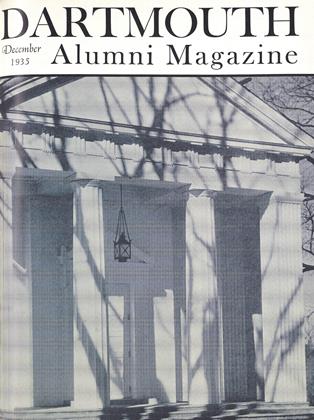adaptation in English of the Gounod musical setting for Moliere's MedecinMalgre Lui. Music arranged by Marshall Bartholomew, director of the Yale Glee Club and the libretto by Alexander Dean '16, Associate Professor of Play Production, Yale School of Drama. Silver, Burdett and Co. $4.00.
This elaborate volume is much more than a reprinting of the original work with an English translation. Both libretto and score have been completely rebuilt by these talented editors to make possible in America the staging of this all but forgotten opera comique, the first of Gounod's compositions to win popular success. Laying aside his half finished Faust, for which he had lost hope of production, he quickly composed in 1858 for the Theatre Lyrique a musical setting for Moliere's farce, and did so in a style so completely different as to defy identification with his later and better known works. Gay, gracefully Gallic, and in the spirit of Lully, the score won instant recognition for the young composer, especially as its first production was notably brilliant. His libretto was the Moliere play with few changes except the addition of a chorus of wood-choppers, which the present adapters have rightly considered an awkward intrusion.
Not only have they substituted a chorus of Louis XIV's courtiers, who, with the king, watch the performance taking place on an inner stage, but they have suppressed much of the original libretto which outweighed the music, and much of the music which was an interruption of the action. The result is a swift-moving and actable musical comedy that conserves the spirit of the original in a more telling stage piece than that composition could conceivably have been.
Although the reconstructions are of a sweeping nature they are essentially conservative. Lovers of Moliere, however, will find much to cavil at in the condensations and rearrangements of scenes and in the rendering of lines; and little to admire in the lyrics that replace the scraps of Moliere originally used for the songs. But these alterations find ample justification if one accepts the editors' main objectives, which were: to furnish variety and picturesqueness, and to increase interest in the plot of the eloping lovers—in short, to turn an unbalanced musical setting of a play into a sprightly lyrical comedy. Some of the changes are notably good. The substitution of Leander in disguise for Sganarelle in the scene where Geronte ironically tells how he has kept the lovers apart, is a happy invention of Mr. Dean's that Moliere might very well have used to heighten the fun of that passage.
The editors would have done well to provide a French text to parallel the English. Their work would then have been available for the large number of college organizations that produce in French, and for whom the admirable revitalizing of an almost unusable score would prove a refreshing departure from the routine of mounting the French repertory.
The editors and their publishers have spared no pains to make this volume a thing of beauty as well as a help to producers. In addition to careful prefaces it contains color designs for scenes and costumes and detailed production notes, even including hints for publicity. Typically admirable are the directions for performing the celebrated sextette.
This publication places in the hands of any choral dramatic group capable of careful stylization a highly effective medium of entertainment. The comparative simplicity of the music and dialogue for so elaborate an operetta should make it available even for advanced high school organizations.
 View Full Issue
View Full Issue
More From This Issue
-
 Class Notes
Class NotesClass of 1911
December 1935 By Prof.Nathaniel G.Burleigh -
 Article
ArticleAND WHAT DOES IT MEAN?
December 1935 By Bill Cunningham '19 -
 Class Notes
Class NotesClass of 1914
December 1935 By Edward leech -
 Class Notes
Class NotesAll in the Day's Work
December 1935 By Claude T.Huck -
 Class Notes
Class NotesClass of 1910
December 1935 By Harold P.Hinman -
 Article
ArticleForgotten Dartmouth Men
December 1935 By Josephine C.Chandler
Books
-
 Books
BooksFACULTY PUBLICATIONS
January 1920 -
 Books
BooksTHE CONNECTICUT RIVER AND OTHER POEMS
February 1940 -
 BOOKS
BOOKSEditor’s Picks
MAY | JUNE 2019 -
 Books
BooksANNAPOLIS TODAY
March 1939 By Ralph A. Burns. -
 Books
BooksPANORAMA DE LA CIVILIZACION ESPANOLA.
JUNE 1963 By ROBERT H. RUSSELL -
 Books
BooksHOURS OF WORK.
JANUARY 1966 By ROBERT M. MACDONALD



